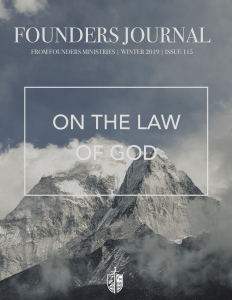Paragraphs 6 and 7
Chapter XIX
Second London Confession
The first five paragraphs of Chapter 19 confess our forefathers’ understanding of Scripture concerning the moral law of God, identified by them as the Ten Commandments. The moral nature of God, reflected in Adam’s nature, was written on Adam’s heart at his creation (Romans 2:14–15). This is identified as the same law as the Ten Commandments of God, given to the Jews at Sinai (2:20–23). It is this moral law which is still written in remnant form on the heart of all men, their conscience bearing them witness. Thus, God’s standard of righteousness and the basis for His judgment of all men is the Ten Commandments (3:19–20). This was clarified and reiterated by our Lord Himself in Matthew 5:17–22. These commandments fill up the meaning of the two great commandments of love to God and man (Matthew 22:36–40; Romans 13:8–10).
Therefore, paragraphs 2LBC 19:6–7 explain how the Christian is to follow the law of God in his daily life. Having been freed from the condemnation of the law broken by Adam and by each of their own committed sins, having a perfect Savior who kept and fulfilled the Covenant of Works given to Adam, having one’s sins against the law atoned for by the efficacious atonement of our impeccable Savior, now the believer lives no longer under law but under grace all the time (Romans 5:1–2).
And yet, freed from the condemnation of the law covenant in Adam, the believer still lives under the definition of righteousness and of sin identified in the Ten Commandments of God (1 Cor. 9:21–22). Under grace, the redeemed and forgiven believer delights after the law of God in the inner man, and seeks to keep it with a living faith in Christ (Rom. 7:22; versus 8:7). This is, biblically, the pursuit of holiness and Christlikeness often eluding the preaching and teaching in today’s evangelical-reformed churches (see Chapter XIII:3). If a believer would pursue Christlikeness, he/she must love God and man as defined in the Ten Commandments which Jesus perfectly embodied:
2LBC Chapter 19:6–7
19.6. Although true believers be not under the law as a covenant of works, to be thereby justified or condemned,13 yet it is of great use to them as well as to others, in that as a rule of life, informing them of the will of God and their duty, it directs and binds them to walk accordingly; discovering also the sinful pollutions of their natures, hearts, and lives, so as examining themselves thereby, they may come to further conviction of, humiliation for, and hatred against, sin;14 together with a clearer sight of the need they have of Christ and the perfection of his obedience: it is likewise of use to the regenerate to restrain their corruptions, in that it forbids sin; and the threatenings of it serve to shew what even their sins deserve, and what afflictions in this life they may expect for them, although freed from the curse and unallayed rigour thereof. These promises of it likewise shew them God’s approbation of obedience, and what blessings they may expect upon the performance thereof, though not as due to them by the law as a covenant of works; so as man’s doing good and refraining from evil, because the law encourageth to the one and deterreth from the other, is no evidence of his being under the law and not under grace.15
13 Romans 6:14; Galatians 2:16; Romans 8:1; 10:4. 14 Romans 3:20; 8:7, etc.
15 Romans 6:12–14; 1 Peter 3:8–13.
19.7. Neither are the aforementioned uses of the law contrary to the grace of the Gospel, but do sweetly comply with it,16 the Spirit of Christ subduing and enabling the will of man to do that freely and cheerfully which the will of God, revealed in the law, requireth to be done.17
16 Galatians 3:21. 17 Ezekiel 26:27.
Paragraph 6: The Uses and Blessings of the Law of God for Believers
It is of great interest that Paragraph 6 is the lengthiest paragraph in this chapter on the law of God. The purpose of this paragraph is to identify biblically and to explain practically the relationship of the born-again Christian to the moral law of God. In so doing, great effort is given to clarify that the believer no longer is “under law” in its condemning power but now lives continually “under grace” in Christ. This continual clarification removes any accusation of legalism in justification or sanctification. Legalism is defined by seeking to gain God’s blessings by one’s own obedience alone. Evangelical obedience is from being justified, not to be justified.
1. First, the paragraph states that though the law no longer condemns the true believer before God, yet it still has great use as a rule of life. Then it lists three ways that it is of use to the Christian:
a. It informs the believer and others of the will of God and their duty which binds them to walk accordingly. Here the confession is dealing with the truth that all men are responsible to God to obey His law (defined as the Decalogue) as the standard for obedience and judgment. This application of the law to the Christian has received opposition in the past and in the present day. It is objected that the mention of duty or binding to obedience is a return to legalism and works-righteousness. However, it is clear that the confession simply states that all men are bound by God’s law as a rule of life, whether non-Christian or Christian.
And what is duty? Those who object to this word assume that it always means “to pay a debt.” However, it is a command of God for Christians to give to all what is due them, whether they are indebted to them or not (Romans 13:7). It is God’s will for us to give what is due others, whether tax, custom, fear, or honor. For the Christian to fear God as their Father under grace (Acts 9:31; 1Peter 1:17–18; Revelation 15:4) and to honor the law of God as His standard for righteousness and Christlikeness (Romans 7:12) is a duty not based upon paying back a debt which can never be repaid, but in giving respect to those to whom it is due, including God and His law (Romans 13:7; 7:12, 8:4). We must not let semantics and debates about words confuse us against the plain statements of Scripture: “If you love Me, you will keep (guard, watch) My commandments” (John 14:15; Matthew 28:19–20). Objections to the duty of honoring God and His law betray either confusion or a tendency toward historic antinomianism. To obey God’s law is a privilege, not a burden, to those who love the nail-pierced One who commands them (Matthew 28:19–20).
b. Further, the law of God discovers and unveils sin in our hearts and lives to convict us of our guilt for breaking God’s law and to produce a hatred of sin in us. The existence of remaining sin in the Christian’s heart and life is a grievous reality. To have God’s law as a continuing standard to expose remaining sins in our minds and lives is a great help and blessing of God to expose sin, renew repentance, and flee to Christ by faith alone for fresh cleansing for sin (see Matthew 5:21–22; 1 John 1:9).
c. In addition, the conviction of the law by the Spirit also points us to a clearer understanding of the Lord Jesus Christ in His personal perfections and His sufficiency as a perfect Savior for their need. He kept each commandment perfectly in thought, word, and deed as substitute. Thus, the law functions as the standard to reveal our spiritual poverty in the light of a Holy God who justly condemns all men by nature. When the Holy Spirit convicts the mind and heart of sin, righteousness, and judgment, then the non-Christian is enlightened to their terrible sinfulness and need of Christ (John 16:8–11). But the Christian also is convicted of their remaining sins by the same standard of God’s law and refreshes their need to flee to Christ, confessing their sins to Him (1 John 1:9). Therefore, the law as a rule of life is of great use to both to examine their thoughts, words, and deeds as approved by God or not. Sin is the transgression of the law both for believers and unbelievers (1 John 3:4; Romans 3:20).
2. Second, the law is “likewise” of use to the regenerate for blessings. By the use of “likewise” it is clear that the previous point had main reference to the unbeliever but included the believer as responsible for obeying the same law. Now, “likewise,” the confession addresses the born-again believer directly.
a. The law restrains the remaining corruptions in the Christian in that it forbids sin. This places the standard of God’s righteousness before the Christian every day. It reminds them that all their sins—past, present, and future—have been atoned for in the Lord Jesus Christ; yet it also keeps before them their remaining sinfulness which may yield to temptation at any time. Remembering the law of God, that our Lord kept it perfectly, that He had to suffer for all our sins, places a guard in the Christian’s mind to restrain being tempted by sin. To sin against our perfect and loving Savior and His commandments is abhorrent to the true believer. By reminding us of what is sin against God, the law restrains us from dishonoring our Lord.
b. Even the threatenings of the law to the unconverted, though the Christian is no longer subject to such threatenings under grace, assist the converted to understand what even their “Christian” sins still deserve but for the grace of God. This humbles them, warns them, and prevents them from taking advantage of the grace of God to “sin that grace might abound.” God hates the sinner and his sin before regeneration, but after regenerating those whom He loves, He still hates the evil of their remaining sins. Each Christian’s sin committed still requires the remembrance of judgment escaped and of redemption accomplished by the bloody death of Christ. Therefore, the threatenings of the law to the unconverted still help the converted to “watch and pray that you might not enter into temptation.” Further warnings to confessing Christians who are becoming dull of hearing exhort them to persevere to the end (Hebrews 5:11–6:9).
c. Though freed from the curse and condemnation of the law by faith alone in Christ alone, though freed from its “unallayed rigour” (absolute perfection) to please God, the law still reveals one’s sins by which God may send afflictions in this life. Sometimes afflictions and trials are not sent because of specific sins committed but for the purpose of purifying one’s faith in Christ (1 Peter 1:6–7). At other times they are so sent (1 Corinthians 11:29–32).
However, it is the 2LBC 19.6 which adds the words “unallayed rigour” to the Westminster and Savoy identical paragraphs. Baptists wished to emphasize that, “under grace,” the rigor of the law demanding perfection before acceptance is now gone for the walking Christian. Samuel Bolton explains:
Observe that the believer is freed from the rigour of the obedience required in the law. He is not freed from the requirement of exact obedience, but from that rigour of obedience which the law required as a condition of salvation.1
The rigour of the law … required universal and actual, as well as personal, obedience, yea, and with such a degree of rigour that if a man failed in one tittle he was lost for ever… The Gospel admits of repentance, but the law will not own it. The law looks for exact obedience in every jot and tittle. From this rigid obedience has God freed the believer. Instead of universal actual obedience, God is pleased to accept of universal habitual obedience, as we find it written: “Then shall I not be ashamed, when I have respect unto all thy commandments” (Ps. 119:6). Though there may be failing in action, yet where there is truth of affection, God can own it. In the Gospel God accepts affections for actions, endeavours for performance, desire for ability. A Christian is made up of desires, of mournings, thirstings, and bewailings: O that my ways were directed! O miserable man that I am! Here is Gospel perfection.2
Under grace, the Christian walks by saving faith in Christ, seeking to keep His law and commandments, knowing that God accepts his/her attempts to obey though imperfect in themselves. No longer under the condemnation of the law, the law becomes the friendly guide to Christlike righteousness which is pleasing to his Father in heaven. Such great truths persuade the believer to pursue sanctification, without which no one shall see the Lord (Hebrews 12:14). For true saving faith, under grace, always seeks to love Christ and to keep His commandments (John 14:15; Romans 6:14).
d. The promises of the law also show God’s approval of obedience and the just reward a believer may expect upon keeping (guarding, watching) God’s commandments (John 14:21). Yet, these rewards are not on the basis of the Covenant of Works to gain God’s blessings, but they are rewards for an imperfect obedience performed while under grace (1 Corinthians 3:10–15). And even then, this obedience is due to God’s work of grace within their hearts and minds (Philippians 2:12–13). Therefore, God’s blessings (rewards) for faithful obedience is no evidence of the Christian’s being “under law” and not “under grace” (Romans 6:14).
Again, the objection to the Christian having a legalistic “eye to rewards” in their obedience to God’s law is a false charge leaning toward some historical antinomian views. Our forefathers understood that faith’s pursuit of obedience to God’s law while “under grace” is not legalism for justification. Rather, the exercise of faith in Christ by obedience to His commands results in Christlike sanctification to the glory of God.
Paragraph 7: The Mutual Support of the Law and the Gospel for Christian Obedience
19.7. Neither are the aforementioned uses of the law contrary to the grace of the Gospel, but do sweetly comply with it,16 the Spirit of Christ subduing and enabling the will of man to do that freely and cheerfully which the will of God, revealed in the law, requireth to be done.17
16 Galatians 3:21. 17 Ezekiel 26:27.
Here the confession affirms that the use of the law for obedience in the Christian life in no way contradicts living “under grace” in the gospel of our Lord Jesus Christ. Although there is an obvious difference between the law-covenant (works-righteousness) and the gospel covenant (faith-righteousness), yet there is also a great harmony and mutual support between them. Later than the 2LBC, the New Hampshire Baptist Confession (1833) captured this unity in a short paragraph:
XII. THE LAW AND THE GOSPEL
We believe the Scriptures teach that the Law of God is the eternal and unchangeable rule of his moral government; that it is holy, just, and good; and that the inability which the Scriptures ascribe to fallen men to fulfil its precepts, arises entirely from their love of sin; to deliver them from which, and to restore them through a Mediator to unfeigned obedience by the holy Law, is one great end of the Gospel, and of the Means of Grace connected with the establishment of the visible church.
The 2LBC (the Philadelphia and Charleston Baptist Confessions) and the NHBC were the working confessions of American Baptists up to the 1925 Baptist Faith and Message (SBC). So, one can see that the moral law of God was taught to Christians to live by under the grace of the gospel.
Further, the emphasis of Paragraph 7 upon the Spirit of Christ working in man shows the connection between the Spirit’s work and the Law of God in the Christian life. Here the confession explains that the Holy Spirit of Christ subdues and enables the will of man to do God’s will cheerfully and freely (Ezekiel 36:26–27). And that will is revealed in the Law of God which He requires us to obey. This is why biblical sanctification is defined in the 2LBC 13.3 as:
13.3 In which war, although the remaining corruption for a time may much prevail,10 yet, through the continual supply of strength from the sanctifying Spirit of Christ, the regenerate part doth overcome;11 and so the saints grow in grace, perfecting holiness in the fear of God, pressing after an heavenly life, in evangelical obedience to all the commands which Christ as Head and King, in his Word hath prescribed to them.12 (emphasis added)
10 Romans 8:23. 11 Romans 6:14. 12 Ephesians 4:15,16; 2 Corinthians 3:18; 7:1.
The above quotation explains that the Holy Spirit of Christ (through regeneration and indwelling) enables the will of man to do willingly the law of God. Using the language of the 1LBC (1644/46), which is excluded from the WCF and the Savoy paragraph, the 2LBC affirms “pressing after an heavenly life, in evangelical obedience to all the commands which Christ as Head and King, in his Word hath prescribed to them.” These statements by our forefathers make clear that any teaching on sanctification that does not enjoin obedience to God’s law under grace, empowered by the Holy Spirit’s work within, is defective and leading the Christian into an erroneous understanding of what is Christian growth and holiness.
The remedy to today’s lack of Christlike holiness by professing Christians is not neglect of the law while fostering grace and the Holy Spirit’s fullness. Rather, it is to teach that the believer under grace, no longer condemned by the law, whose obedience is no longer accepted by the former rigor of the law, is still commanded by God to keep, guard, watch, and live by His law. This is not legalism as charged by some but simply living by a justifying faith in Christ according to His commandments. This is sanctification. This is how Jesus Himself lived in obedience to all of God’s commands, thus defining what it means to love God with all your heart, your neighbor as yourself, and loving Christians as Christ first loved us. As John exhorted Christians:
My little children, I am writing these things to you so that you may not sin. And if anyone sins, we have an Advocate with the Father, Jesus Christ the righteous; and He Himself is the propitiation for our sins; and not for ours only, but also for those of the whole world. By this we know that we have come to know Him, if we keep His commandments. The one who says, “I have come to know Him,” and does not keep His commandments, is a liar, and the truth is not in him; but whoever keeps His word, in him the love of God has truly been perfected. By this we know that we are in Him: the one who says he abides in Him ought himself to walk in the same manner as He walked (1 John 2:1–6). (emphasis added)
It is so very clear in the above quotations that to walk as Christ walked (i.e., holiness, Christlikeness) involves depending upon Christ by faith as one’s Propitiation and Advocate while studying and seeking to keep His commandments in the same manner as He did; i. e., thoughts, words, and deeds. Christian holiness requires believing in Christ alone for one’s justification all the time. But Christian holiness also calls the believing one actively to guard and keep the law as He did. This is a Lordship salvation that perseveres to the end (Philippians 2:12–13).
The word “keep” (guard, watch, protect) does not mean that the justified believer must “keep” the law perfectly for one’s obedience to be accepted by God. Rather, it means to watch after the law and commandments continually as you walk by faith and seek to obey them. There is no such thing as perfectionism in behavior until heaven where “the spirits of righteous men made perfect” live (Hebrews 12:23). Yet, believers are commanded by God to guard their thoughts, words, and deeds by the law of God. The believing Paul said: “So then, the Law is holy, and the commandment is holy and righteous and good” (Romans 7:12). The contextual meaning of “Law” is the Decalogue (Romans 7:7).
In sum, the goal of our instruction is love (1 Timothy 1:5). And love is the fulfilling of the law (Romans 13:8–10) in loving submission to our Lord Jesus Christ “under grace” (Romans 6:14).
NOTES:
1 Samuel Bolton. The True Bounds of Christian Freedom (London: The Banner of Truth Trust), 40. This work is highly recommended for a thorough study of the Law and the Gospel in the believer’s life. It shows that the once-for-all justified believer lives by faith under grace while seeking to obey God’s unchanging Law. Though written in 1643, he answers the same questions being explored today by Baptists.
2 Ibid., 42.























